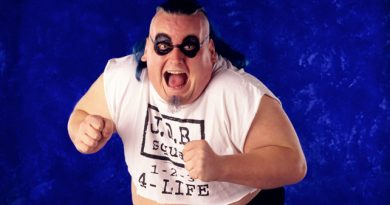Pick My Brain Interview: Ben Miller
Internet Wrestling Columnist
Ben writes columns every now and then for WrestlingObserver.com. You definitely need to check out some of his fine articles there.
Ben is a serious guy who means business, and while this isn’t the best website for serious people, we enjoyed his interview nonetheless.
So sit back and enjoy picking the brain of… Ben Miller.
1. First off, tell us what you’re up to and where we can read more of your work. In other words, plug anything you wanna plug.
I write for the Wrestling Observer Newsletter and website. Generally I write about a column per month for the newsletter and I try to get in a short column every week or two for the website. The address is WrestlingObserver.com. You can find information on ordering the newsletter at that website.
2. Most wrestling fans would consider it a major coup to be a columnist for the Observer. How did you get the gig?
I was a big wrestling fan as a child but when the industry veered more towards cable television in the early nineties I was unable to follow it as closely because I didn’t have cable. When I got to college I began watching Raw and Nitro again in early 1996, right around the time Hogan was battling the Dungeon of Doom and the buildup to Wrestlemania XII was going on.
When my roommate got a computer with internet access I went to several online websites, starting with Mike Samuda’s old website, “MiCasa”. I was amazed at the amount of inside information on the internet so I began reading every day and in February 1997 I used USC’s free student websites to create a website of my own called, “The Rock Report.” I tried to cover as much as I could of the online scene but updates were not consistent because I didn’t own a computer of my own.
In March, 1998, Mike Samuda created, “Wrestlemaniacs” along with “Online Onslaught” owner Rick Scaia and he put out a notice seeking columnists. I sent him a few pieces I wrote for The Rock Report, including a piece on how pro wrestling could never again become as large as it was in the 80’s and another sentimental piece written in memory of Shawn Michaels’ career after the infamous, “lost my smile” speech in 1997.
He agreed to sign me on as a columnist. Mike asked me to come up with a name for my weekly column, and not being able to think of anything, I chose, “Eye of the Storm.” That actually lasted just one week as some wingnut from Tennessee sent me a detailed email about how he owned that name as it pertained to wrestling journalism from covering some podunk promotion so since I wasn’t enthralled with the name anyway, I changed the column to, “Millertime,” which is the name it kept for the next 3 1/2 years. I also changed the name of my website from, “The Rock Report” to, “MillerTime Archives.”
In June of 1999 Sportsline.com decided they wanted to latch on to the online wrestling boom and they bought out Wrestlemaniacs. Mike was nice enough to bring me along as a columnist. With the Sportsline name I was able to do a few interviews that I am extremely proud of with Vince Russo a few days before he left the WWF for WCW (I swear I still think that interview helped him get that job), Sonny Oono shortly after filing a racial discrimination suit against WCW (where his lawyer foolishly tried to rewrite history in a combative interview) and Shane Douglas shortly after his falling out with WCW.
In June of 2001 Sportsline.com finally offered to pay for my columns, but when the offer came in at a pathetic $25 per week I started to look elsewhere. Wade Keller of the Torch contacted me about Wrestlemaniacs’ contract with Sportsline coming up and so I considered his offer.
I asked several people for advice on leaving for the Torch, including Dave Meltzer. When I finally agreed to leave, I wrote Dave an email thanking him for his advice and he said that if I was going to leave anyway, why not come to the Observer? Obviously, that was a no-brainer though I did feel bad about accepting the offer from Keller and even posting on my Wrestleline column that I was leaving for the Torch, and then backing out and going to the Observer. I did write to apologize to Keller, but of course I never got a response. Then in typical Keller fashion, he wrote a column on the Torch website contradictory to my very first column on the Observer site later that day.
The timeline on that all happened in about July of 2001. Unfortunately with the collapse of WCW and the lowering in quality (at least in my opinion) of the Japanese products, there has been far less interesting topics to write about in my time at the Observer than there were when I was working for no pay at Wrestleline.
3. In your opinion, who had the most success in wrestling without having a world class physique?
A. Mick Foley
B. Roddy Piper
C. Ric Flair
D. Dusty Rhodes
E. Bobby Eaton
F. Mikey Whipwreck
G. Sandman
H. Gorgeous George
I. Other
I think putting Flair and Piper in a group with Foley is ridiculous because both Flair and Piper used steroids regularly in the eighties and it appears that Flair still uses some physique enhancing drug even today. Actually, I can’t be sure that Flair ever did but Piper admitted it to me in an interview.
Foley in my opinion had the most success with a physique that you would in no way associate with a wrestler, but he wrestled a hardcore style that is probably a bigger plague on this industry than steroids will ever be.
4. You wrote that promotions can do better business promoting wrestlers who have better physiques. Explain why the following ripped wrestlers never drew much money:
Sid Vicious:
Lex Luger:
Warlord:
Barbarian:
Sean O’Haire:
Ted Arcidi:
You’re missing the point of what I wrote. Just because a better physique enables wrestlers to draw more money does not mean that a great physique is a guarantee of success on wrestling’s top level. It is ridiculous to argue that a bodybuilder with no charisma or wrestling ability to draw just as it is ridiculous to argue that a wrestler’s physical appearance has no bearing on his ability to draw.
Remember that exceptions are needed to prove the rule. Foley and Rhodes are exceptions to the rule that fans respond to great bodies. There are dozens of cases for every case like theirs that prove the rule.
5. If physiques are more important to fans than ability, then what is your response to the fact Ted DiBiase was a huge star in the WWF while Virgil never broke out of the undercard?
Comparing single examples in any argument is foolish. You have to look at the macro view, not the micro view. Any idiot can argue that economic reform in America is not needed because every American child has at least a chance for professional success. The fact is, though, that children that grow up surrounded by crime and poverty will always have a higher propensity to commit crimes on average because of their surroundings. The same applies here. Looking at the WWF’s economic success it is clear that their periods of success are more closely tied to great looking bodies than great workrate.
6. Meltzer once wrote in the early 90s that his solution to the steroid testing would be a system something like this:
1) Give the guys several weeks warning that they need to get off the juice.
2) Have a bodybuilding physique expert or doctor evaluate each guy’s physique visually to determine if he is still on the juice.
3) If the doctor/expert says someone is still on, then that person has to do a clean job on TV.
4) To avoid legal problems, the guy would have to job to someone of superior in-ring ability.
The problem with this system is that:
a) How can you officially and legally declare someone as having superior in-ring ability, and
b) It equates doing clean jobs as punishment, and a healthy locker room environment should consist of guys who see the value in clean finishes and putting over others at the right time when it’s good for business.
What are your thoughts on that system?
I don’t like that particular system and, though I can’t be sure, I would argue that with another decade of hindsight Dave would probably not view that as a good system.
In my opinion, the best way to curtail steroid use is to institute testing and unilaterally enforce punishment regardless of who gets caught. That is only a good system if your goal is to curtail use and no other factors are important. Of course you will still have use under that system, but it will be curtailed.
If I were running a promotion (and you should take this with a grain of salt because I have never been exposed to the pressures of actually having my finger on the trigger of an entire promotion) I would try to find friendly doctors who understand the realities of the business and make appointments for wrestlers that want to do cycles occasionally so that if they are going to do it, they do it in the healthiest way possible. I don’t believe that conservative steroid use is a terrible killer and I would hope that my wrestlers would largely be willing to meet with a professional to use in the safest way possible if they insist on using.
7. In my opinion, addiction to painkillers is just as dangerous as addiction to performance enhancing drugs. If you were in charge of WWE, would you take steps to alleviate the plethora of big bumps and the ultra-physical style that lends itself to painkillers?
I don’t believe that performance enhancing drugs are actually physically addicting but I agree 100% with your point. The problem really starts at the foundation of the business where young wrestlers are allowed to perform high risk stunts. My solution would be to not allow anyone on television who doesn’t show an ability to work a quality match without a single highspot. I believe that highspots are more the results of a wrestler’s craving for public acceptance than anything and if the wrestler has the ability to get a great reaction from a normal match, he is far, far less likely to put his body at risk.
Also, i believe using guaranteed contracts so that wrestlers are allowed to stay home and heal without their pay being cut is another way to curtail painkiller use.
8. To alleviate the constant pain of the big bumps, I’d totally eliminate house shows. It’s a drastic measure, and house shows are a major revenue stream, but it would save lives. The problem with that is the young guys don’t get the experience and the chance to improve that house shows provide. My answer to that is simply hold practice sessions like pro sports do. This would also allow ring veterans like Malenko and Arn Anderson to act as coaches to the younger guys. What is your take on that idea?
I think eliminating house shows is a terrible idea. I believe a better idea is working storylines so that wrestlers get about a month off each year from the schedule. House shows are so vital to business as far as keeping fans in various cities feeling like they are part of the company that there is no way I would eliminate them. I believe working 3 or 4 days a week with one month off per year would at least reduce painkiller use a good amount.
9. As unfair an advantage as steroids or HGH provide, it is also unfair that some have better genetics than others. I mean, Dustin Rhodes could eat steroids for lunch and dinner and not look like Lex Luger. And Juventud Guerrera will never be as tall as Kevin Nash. By that token, suppose a clean Dwayne Johnson and a clean Dean Malenko had the same exact in-ring ability and promo skills. Would it be unfair to push Dwayne ahead of Dean? Johnson’s only advantage would then only be height and a body that reacts better to weight-training.
In other words, you can say Undertaker’s main aura wasn’t his physique, but he did get over partly on his huge natural size. And when he first got over, his arms were MUCH bigger than they are now.
I don’t think Undertaker’s arms were bigger than they are now, and in fact I believe they were smaller back in 1991 when he first hit it big. I believe you push wrestlers based on what is best for your company as long as wrestlers are following your company’s rules regardless of any other mitigating factors. If you made the decision to not test for steroids, it is hypocritical to shortchange a worthy push because you suspect he is on the juice. As a promoter you simply have to trust your bookers to make decisions that will be best for the company without worrying about any other factors.
10. Suppose you had a son who wants to be a wrestler. Would you rather he jump off the roof into a pool of thumbtacks, or take performance enhancing drugs?
Of course I’d rather have him take steroids. Jumping off a roof is so stupid on so many levels. I wouldn’t recommend that he take steroids and I would probably forbid him from training if I found out that he did, but given the choice it is an easy choice to make.
11. A supplement with much more widespread use among youths is creatine. Studies haven’t proven as many negative side effects, but its long term potential damage is unknown. What is your take on creatine?
I have taken creatine, though admittedly my use wasn’t disciplined enough to actually make as much of a difference as I wanted it to. It is no where close to what steroids or HGH can give you and I would sincerely doubt that it will prove to be very harmful long term.
I don’t think I would endorse kids younger than 12 taking creatine but as far as teenagers go I think it is safe enough to warrant use if you actually can afford such an expensive product for relatively minimal gains.
12. What is the greatest match you have ever seen?
I have to go with Hart vs. Austin at Wrestlemania 13 in the Submission Match. The buildup, match and finish was everything pro wrestling should be at it’s greatest in my opinion.
13. Who is the most immoral of the following and why?
A. Vince McMahon
B. Pat Patterson
C. Mel Phillips
D. Jake Roberts
E. John Collins
F. Terry Bollea
G. Carlos Colon
Jesus H. Christ. Everyone has their good and bad points so I’m not going to judge morality based on rumors and stuff I’ve read about people’s careers.
14. Noted wrestling fan and epidemiologist, Dr. Jeff Levin, said in 1991 that pro wrestlers were among the highest risk groups for HIV infection. Do you think promoters should test for HIV if they insist on making blading part of their product?
No. If Jeff Levin still believes that (and I would strongly suggest that he doesn’t) then I don’t believe Jeff Levin knows what the hell he’s talking about. Remember that in 1991 people didn’t want Magic Johnson playing basketball because it was rumored that sweat could transmit HIV. My guess is that is the reason that Levin said that. I believe that HIV transmission probably is a greater source of misinformation among the American public than just about every other issue besides the conflict in the middle east.
15. What do you predict the wrestling landscape will look like in 5 years?
I believe that the WWF will lose its place on network television and I believe that Ted Turner will allow pro wrestling on a network that he will start up.
16. If NWA TNA ditched the Russo philosophy and did a straight-ahead traditional wrestling approach, would their chances of success be any higher?
Yes, but without television they still would be nearly zero.
17. Since you’re not an old-time wrestler from the territorial days, you might have a different opinion on this. Does Shawn Michaels belong in the Observer Hall of Fame?
Of course he does. I have written columns promoting his entry every year since he has become eligible.
18. Should professional wrestling newsletters cover MMA? What does MMA have to do with wrestling anyway? You can make the argument that many elements do cross over, but you could also make that argument with amateur wrestling or pro football too.
Yes, pro wrestling newsletters should cover MMA. They also cover amateur wrestling, though the coverage on that is less intense because MMA is a more popular sport world wide and among the readership of wrestling newsletters.
MMA is basically what pro wrestling would be if it were real.
19. You’re in a dark alley surrounded by 3 tough-looking thugs in the middle of the night. Who would you pick to be on your side and why?
A. Kurt Angle
B. Dan Severn
C. Ken Shamrock
D. Brock Lesnar
E. Steve Williams
F. Bart Gunn
G. Haku
H. Barbarian
I. Big Show
J. Adrian Street
Which ever one is carrying a gun.
20. Finally, what is your favorite era in wrestling and why?
I like the mid-nineties because I felt it had something for every type of fan. MMA, Hardcore style in ECW, star power in WCW, great main events in the WWF, cruisers in WCW and New Japan, heavyweights in All Japan and one of the hottest periods of lucha ever with AAA.
Lest anyone get the wrong idea, we’re big fans of Ben’s work. He said a lot of things here that made sense, and we applaud his intelligence and thinking process. Be sure to check out his columns.




